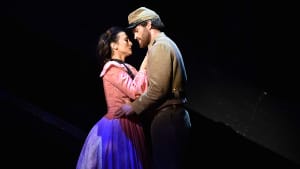Stay in the Loop
BSR publishes on a weekly schedule, with an email newsletter every Wednesday and Thursday morning. There’s no paywall, and subscribing is always free.
From epic novel to operatic realization
The East Coast premiere of Jennifer Higdon’s 'Cold Mountain' (second review)

The challenges of composing and producing the new opera Cold Mountain are no less daunting than those Serge Prokofiev faced in the 1940s writing an opera based on War and Peace. Both operas are based on epic novels with complicated plots and battle scenes; both are stories of a war in the homeland and its impact on life and love.
Cold Mountain, based on Charles Frazier’s novel, examines how the nightmare of the Civil War brought out the best and worst in people. The byzantine plot, which involves a plethora of characters, is centered on the journey of a Confederate soldier, W.P. Inman (sung by Jarrett Ott). After being treated for wounds he received during the battle of Petersburg, Inman chooses to desert the army and make his way back to his beloved Ada Monroe (Isabel Leonard) at the lonely farm where they originally met. Along the way, the people he meets and the situations he encounters challenge his principles and reveal the lowest and most sublime of motives.
The complexity of the plot, and its shifting settings — mountain ranges, farms, streambeds, and thousands of men in pitched battle — present challenges for not only the composer an, librettist, but the production staff. How can this be accomplished on a self-contained stage? The surprising answer turned out to be, “very well indeed.”
Meeting the challenge
As she noted in an NPR interview with Marty Moss-Coane, composer Jennifer Higdon took a two- year sabbatical from her other work to write the score. Her work paid off grandly in the way the music facilitated an exceptional production by Opera Philadelphia.
The stage, with blackened wood planks pointing in all directions, symbolizes conflict, violence, and fate while simulating the terrain of the diverse settings. Images projected on and around the stage, proscenium, and Corinthian columns conjure starlit skies and snowfalls. All of the shifting scenes of the action are magically enacted beneath the proscenium, with the soloists and choruses invoking the specific scenarios by their words, movements, and gestures.
The overall effect evokes the large-scale life and death events of war, survival, and love, while at the same time allowing for the most intimate moments. Kudos to set designer Robert Brill and his associates for a magnificent set that moves things forward relentlessly as Inman’s journey progresses.
Higdon’s “soundtrack” of love, war, and survival
Ultimately, an opera’s success revolves around the music and how well it conveys the story, emotions, and dramatic power of the libretto. In this instance, Philadelphia’s own Curtis Institute and Pulitzer-winning composer Jennifer Higdon did a remarkable job of combining multiple genres of American music — from period folk music to Copland, Bernstein, Barber, and Rorem, to popular forms — into her own fast-moving, richly orchestrated, and lyrically voiced score. Her music conveys the dramatic passions of war and suffering alternating with the most intimate, personal moments of love, reconciliation, and acceptance of inevitable loss.
While the individual arias are expressive enough, Higdon’s score emphasizes the ensemble, continuity, and the combined sonorities of the soloists, chorus, and orchestra. Instead of the usual pause before each aria, the songs emerge naturally from an ongoing “soundtrack,” more like a symphony than a song recital. Did Higdon learn something from Gustav Mahler’s Kindertotenlieder and Das Lied von der Erde?
The struggle of wills
Like the unity of the stage setting, the entire opera emerges from one dominating idea: the division of souls and society resulting from the uncivilized war that disrupted so many lives and dreams in the South. Lecherous bounty-hunter Teague (Jay Hunter Morris) expresses this in his aria “A Fence Is a Good Thing,” in which he discloses that his villainy consists of sepa rating people and pitting them against each other.
rating people and pitting them against each other.
Yet in the end, Teague does not succeed. Goodness is salvaged by mercy, as we see in Inman’s mercy toward the errant preacher Solomon Veasey (Paul Groves) when he encounters him trying to kill his pregnant lover, a slave. It is also salvaged by love, whether between Inman and Ada, or in the heartfelt partnership between Ada and Ruby Tewes (Cecilia Hall), who work together to salvage Cold Mountain and realize Monroe’s dream of a homestead.
The opera succeeds because, despite the multitude of scenes and characters, Higdon and the production company weave it all into a unified whole, creating an unfolding dialectical thesis-antithesis-synthesis out of the diverse conflicts.
Saving opera from itself
Opera is a bastardized form of music that developed out of royal court entertainments and thrives on grandiose pomposity. Opera lovers flock to experience hyperbolic voices, impossibly fictionalized plots, and overblown stage settings and costumes. (I once went backstage at the Met and saw Kiri Ti Kanawa’s wig from Mozart’s Cosi Fan Tutti being wheeled into storage: it was taller than she was!)
Recently, some modesty and proportion have been introduced, at least in some modern operas. Today, the characters are more simply human, the plots more realistic, and the optics more proportional. Cold Mountain manages to retain enough of the grandiose proportions of plot, effects, and setting to satisfy the opera buffs while — largely though the words and music — a more humble humanity comes through, and the music retains some of the restrained qualities you would hear in a salon or concert hall.
Such a reconciliation of opposites is no mean achievement. It moves opera forward a notch and gives Cold Mountain a permanent place in the repertoire.
For Steve Cohen’s review, click here.
What, When, Where
Cold Mountain. Opera by Jennifer Higdon. Libretto by Gene Scheer based on the novel by Charles Frazier. Leonard Foglia directed; Corrado Rovaris conducted. East Coast premiere Opera Philadelphia production at the Academy of Music, February 5-14, 2016. 215-732-8400 or operaphila.org.
Sign up for our newsletter
All of the week's new articles, all in one place. Sign up for the free weekly BSR newsletters, and don't miss a conversation.

 Victor L. Schermer
Victor L. Schermer